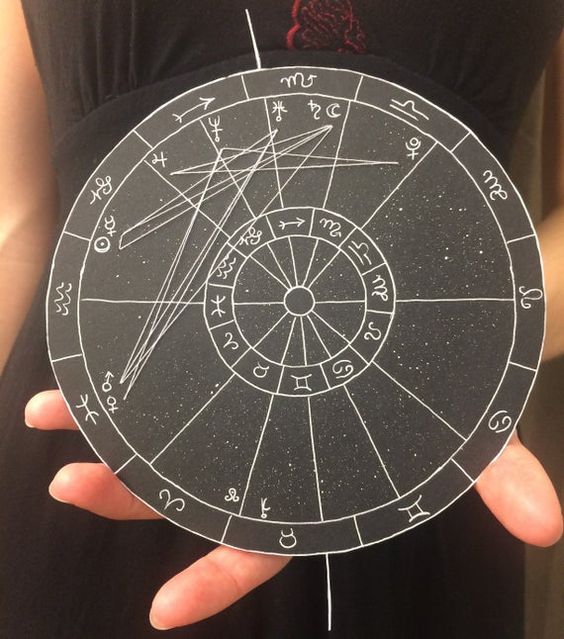
Neptune in the 3rd House: The Power of Imagination
 The 3rd House realm rules the mind, speech, early education, and all the ways we learn to interpret and name this curious world. It’s our childhood where we first encounter a chair and decide to call it “chair,” or point to the sky and muse, “sky.” This house is the sphere of labels, categories, and associations, which we relate to our immediate environment. With Neptune here, the mental landscape isn’t content to rest on mundane labels. Instead, Neptune beckons you to see the archetypes behind these things, the essence or hidden dimensions that others might pass by. This positioning might blur the lines of rationality, injecting a sense of wonder, mystery, or even confusion. Neptune is a planet of dreams, intuition, and inspiration. It suggests that your way of engaging with the world is a touch enchanted—or at the very least, uniquely perceptive. You might struggle a bit with practical details, perhaps drifting off mid-sentence as your mind chases an inspiration or glimmer of an idea. But there’s also a potential here for profound insight, an ability to see beyond conventional boundaries.
The 3rd House realm rules the mind, speech, early education, and all the ways we learn to interpret and name this curious world. It’s our childhood where we first encounter a chair and decide to call it “chair,” or point to the sky and muse, “sky.” This house is the sphere of labels, categories, and associations, which we relate to our immediate environment. With Neptune here, the mental landscape isn’t content to rest on mundane labels. Instead, Neptune beckons you to see the archetypes behind these things, the essence or hidden dimensions that others might pass by. This positioning might blur the lines of rationality, injecting a sense of wonder, mystery, or even confusion. Neptune is a planet of dreams, intuition, and inspiration. It suggests that your way of engaging with the world is a touch enchanted—or at the very least, uniquely perceptive. You might struggle a bit with practical details, perhaps drifting off mid-sentence as your mind chases an inspiration or glimmer of an idea. But there’s also a potential here for profound insight, an ability to see beyond conventional boundaries.
In astrology, the 3rd house is often overlooked in favor of loftier houses dealing with purpose, transformation, or destiny. But here’s the beauty of the 3rd: it’s the practical magic of the mind at work, the “day-to-day wisdom” house. This is where we take in, process, and categorize information as a means to make sense of life.
If you’ve ever felt the calming relief of finally understanding something, or the slight thrill of recognizing a new pattern, then you’ve felt the powerful alchemy of the 3rd House. Liz Greene says that our “mental perceptions” directly influence how we cope with life. Knowledge is, in a way, an emotional stabilizer. This house provides us with the mental tools to name, interpret, and put order to chaos. And when we gain a new bit of knowledge or insight, it’s like giving the brain a little reward, a reminder that things can be understood and, therefore, managed.
Learning makes us feel “in the know,” which is also a form of empowerment. The 3rd House is constantly equipping us with new ways of seeing and understanding. Language, perception, naming—these are the building blocks of identity. This realm is where we first differentiate the self from others, where the world of “me” and “not me” begins. Through early interactions—family, siblings, peers—we begin to weave our initial frameworks of reality. We learn to put labels on things, not just to understand the external world, but to understand who we are within it.
The significance of language here can’t be overstated. Think of the very act of naming—a deeply human impulse. As soon as we put a label on something, it becomes both part of our reality and, simultaneously, distinct from us. This is where the mind crafts itself into a unique entity, colored by family influence and early experiences, yet ever-evolving through language and ideas. And because this house touches on our ability to categorize, the way we label and define others often becomes a mirror, showing us even more clearly who we believe ourselves to be.
As we grow, the 3rd House keeps evolving with us, forever encouraging us to explore, to look around and wonder, “What is that? And what does it mean to me?” It’s a house of self-definition, an arena where our individuality sharpens with every new word learned, every new concept grasped. It’s the very essence of how we come to be distinct, articulate selves in an ever-expanding world.
When a planet like Neptune inhabits the 3rd House, it doesn’t naturally lend itself to straightforward expression. Neptune’s domain is the intuitive, the boundless, the nebulous—qualities that don’t always translate well in an environment demanding labels and structure. You’re tuned into a frequency that’s all about intuition and resonance, while the world keeps hammering on about facts and linear reasoning. In this state, thoughts and feelings don’t line up in tidy rows, ready for inspection. Instead, they drift in waves, with symbols and impressions weaving in and out of focus.
It’s a kind of psychic language, a mode of sensing and intuiting more than rigidly understanding. This way of thinking and perceiving can be brilliantly creative, poetic even, but conventional structures might struggle to contain it. It’s as if the words themselves are imbued with feeling, a language of the heart more than the head. When you’re wired like this, it’s about translating those subtle impressions in a way that allows others to feel them too. This is why artistic expression, storytelling, or anything bypassing strict logic can become a lifeline, a way to share what you sense without forcing it into too many boxes. Not everything can—or should—be so straightforward. There’s wisdom in the ambiguity, and, perhaps, a richer kind of truth.
The Neptuinan mind has to adapt, often finding unusual, even enchanting ways to bridge the gap. It’s less like speaking and more like evoking or transmitting feeling. For those with such a placement, communication often finds a special, unique channel—perhaps art, metaphor, music, or even a mystical, intuitive language that resonates at a deeper level. You may find yourself communicating in symbols or images, relying on indirect ways of expressing complex inner experiences. Often, people with this setup become highly imaginative communicators, connecting on a wavelength bypassing conventional logic to speak to the emotional or spiritual core of others.
Such a placement can create a remarkable talent for connection, albeit not the usual direct line. It’s a talent for reaching into the collective, the dreamlike, the wordless, and finding new forms of expression there. This could mean becoming fluent in picture language, imagery, and even silence, in ways which defy the practicalities of the everyday mind. Others will eventually tune into your frequency, drawn in by the uniqueness of the language you’ve cultivated from those distant, Neptunian shores.
With Neptune here, you seek connection beyond the separateness that words can create. Neptune is wired for unity, for a kind of soul-to-soul resonance, but the world often demands separate distinction and boundaries—qualities which may feel abrasive or even painfully alienating for someone with this placement.
With a 3rd House Neptune, you might come across as dreamy or elusive, your thoughts trailing off into imaginative realms rather than adhering to a clear line. You’re selective listeners, not due to inattentiveness or disinterest, but because you’re filtering reality through a lens that values the unconcious over factual accuracy. This is why you may forget details that others deem important or respond in ways that seem tangential. Many people see it as a sign of lesser intelligence, and it’s frequently misjudged as such. Instead, it’s an subconscious maneuver to preserve a sense of unity, to avoid creating sharp distinctions that could sever their deeply intuitive sense of connection.
In a way, you instinctively knows that words have the power to divide, to label, to put things into stark categories, which can feel isolating. Your reluctance to communicate directly about some things are ways to protect a sense of wholeness, an unspoken desire to preserve the realm of deeper connection. You want others to feel what you’re saying them rather than just understand you. It’s sadly common for you to be unfairly labeled as inattentive, unintelligent, or lacking in communication skills. Neptune’s style of perception is ultra- sensitive, impressionistic, and often non-linear—it flows like water, taking in not just words.
People might say, “You’re not paying attention,” when in fact, you’re paying attention to an entirely different layer of reality. Perhaps you remember how someone felt rather than what they said verbatim. Or you intuit what’s unsaid but miss some factual detail. This isn’t a lack of intelligence or communication; it’s a different kind of intelligence—an emotional, intuitive intelligence which values meaning over mere information.
Misunderstandings often happen to you on frequent basis. This is because Neptune in the 3rd House is wired to avoid harsh boundaries and sharp definitions, aiming instead for harmony and a sort of unspoken resonance. You aren’t always comfortable making bold, definitive statements, as words can feel clunky or even divisive, breaking the sense connection you’re naturally attuned to. You might choose softer expressions or hold back when you sense that directness might create conflict. And because of this sensitivity, you’re often deeply hurt when your way of communicating is met with frustration or criticism.
If others don’t understand this about you, they might interpret your thoughtful, wandering style as a lack of focus or presence, which couldn’t be further from the truth. You’re present—perhaps more present than they realize—just in a different, subtler way. With Neptune in the 3rd, you bring a kind of psychic empathy to the table, a form of communication that speaks to the heart rather than the surface. This can be an incredible gift if nurtured, and it can even help teach those around you that sometimes, what’s felt is just as important as what’s said.
Neptune in the 3rd house can sometimes suggest a tendency toward embellishment or stretching the truth. The Neptunian “lie” can be an elusive, misty thing, hardly a lie at all in the usual sense. It’s not about deception or manipulation, but rather an instinct to soften reality, to paint over the sharp edges that feel too harsh or unbearable. It’s more like a reflex, an unconscious choice to shift reality into something gentler, even if this means bending or glossing over certain truths.
Neptune here isn’t interested in falsehood as much as it is interested in avoidance. The mind naturally drifts toward the comforting notion that if something remains unspoken or vague, perhaps it won’t solidify into existence. It’s as if Neptune in the 3rd says, “If I don’t look too closely, maybe it’s not really there.” And if a harsh truth does slip through, Neptune might unconsciously reshape it, replacing it with a softer version. The world can feel overwhelming with all its demands for certainty, directness, and exactness—qualities Neptune prefers to evade, especially if they involve realities it would rather not confront.
In a world where others take a more black-and-white view of truth, this Neptunian style can seem maddening. People may accuse you of lying or being slippery, seeing your style of glossing over and gentle omission as something more nefarious than it is. But to you, it makes perfect sense; reality, after all, comes in many shades, and not every truth needs to be fixed in harsh terms.
Neptune’s evasiveness can even extend to a kind of intellectual disarming, a “Oh, I’m not clever enough to tackle this,” which encourages others to step in and handle the hard mental terrain. This isn’t lazy or deceptive; it’s a means of finding safety and help in a reality often too intense to tackle alone. Rather than face confrontation or spell out something sharp-edged, Neptune in the 3rd might seek protection in a fog of half-truths and evasions, subtly inviting others to interpret events in a softer light or to shoulder the burden of harsh facts.
This tendency to reshape, gloss over, or “re-dream” reality can be misunderstood by others, who may expect more clarity and directness. But for you, this way of seeing and communicating is a way of survival, an instinctive filter for emotional safety. You don’t lie to deceive; you often bend the truth in search of something gentler, a more fluid reality, allowing you to breathe in a world that sometimes feels all too hard-edged and immovable. And perhaps, rather than criticism, this approach deserves a bit of understanding—there’s a wisdom in knowing when to soften the world’s sharp edges, even if others don’t always see it this way.
Neptune in the 3rd House sees in images, feels in tones, and remembers in waves of color and emotion. Words are only part of the picture, often too brittle to contain the full sweep of Neptune’s perceptions. Instead, your mind drifts into the the symbolic, where meaning isn’t only understood—it’s felt. This visual, imaginative style transforms ordinary communication into something more powerful, bypassing the conscious mind and striking directly at the heart.
Reading a book, for you, isn’t about dry facts or plot points. You see it unfold like a film, each line casting rich visuals and emotions in your mind’s eye. This kind of memory connects abstract concepts; it’s like a series of living snapshots, where every scene is soaked in sensory detail. A single word or sentence might evoke a rush of imagery, immersing you in the experience so fully that it becomes part of your mental landscape. This is where Neptune in the 3rd House can truly shine—what you process is so alive in your mind that it becomes unforgettable, stored as a blend of pictures, colours, and moods. When you communicate, it’s likely to be laced with vivid metaphors, powerful imagery, and poetic phrasing. You instinctively know how imagery bypasses the logical mind and goes straight to the unconscious, where it resonates with emotional truth. A metaphor reaches places facts alone cannot touch, landing its message with force because it speaks the native language of the unconscious. In this way, your words can have a transportive quality, immersing others in a world that’s felt rather than simply understood. With this Neptunian gift, you might find you have a natural talent for poetry, storytelling, painting, or any art form that translates intangible feelings into visual form. Life’s details are less important to you than the essence, the universal quality of things, the underlying patterns shaping reality. The outside world is less a collection of defined objects and more a living landscape of symbols, each with its own tone, color, and energy.
The Art of Communication
This is a remarkable gift, and the more you lean into it, the more you’ll find that your way of perceiving and communicating is an art in itself. You don’t just understand the world; you translate it into something others can feel, experience, and even remember. It’s a mind built for enchantment, one that draws people out of the dry and factual into the living, breathing world of the imaginal. And, really, what a gift it is to be able to offer people a glimpse of reality as you see it—so vividly alive, so richly textured.
Neptune in the 3rd House—a natural bridge to the unconscious mind. With Neptune in this space, the mind works in subtle, almost magical ways, weaving together insights, intuitions, and hidden knowledge. You may receive answers almost as if by “osmosis,” where solutions just appear without a logical sequence. Instead of sitting down to reason through a problem, you might find yourself with a sudden, fully-formed insight or “knowing.” It seems to come from nowhere, and this kind of intuition can be incredibly accurate. Your mind draws from hidden connections that aren’t immediately obvious. This placement is highly suited to automatic writing, a form of letting ideas flow without conscious interference. Writing or journaling can become a channel for your unconscious, allowing thoughts, symbols, and insights to emerge without overthinking. Often, in a free-writing session, you’ll surprise yourself with what comes through, finding ideas or answers you didn’t know were there. Neptune here may open the door to a rich dream life, where your dreams act as guides or teachers. You may have a natural ability to interpret symbols within your dreams, accessing messages from the unconscious that help you understand real-life situations. Lucid dreaming could also be a potential skill, as Neptune in the 3rd makes you receptive to navigating the symbolic world with awareness and intention. With Neptune here, you may be sensitive to others’ thoughts or feelings, almost as if “receiving” them without direct communication. It’s not uncommon for Neptune in the 3rd to pick up on emotions or moods intuitively, translating what others are feeling before they even speak. This ability can sometimes verge on telepathy, where you instinctively “know” things about others without knowing how you know. In moments of deep relaxation or “flow,” you may feel as though you’re accessing knowledge or ideas that aren’t entirely yours. This could be through inspiration, messages from a higher self, or even a sense of connecting with the collective unconscious. You might find yourself noticing recurring themes, symbols, or patterns in your daily life that guide you in subtle ways, almost like a breadcrumb trail laid out by your unconscious mind. These “clues” often reveal larger patterns or paths you might otherwise miss. Art is a natural channel for the unconscious mind, and Neptune in the 3rd brings a natural affinity for visual or artistic expression. You might be drawn to painting, drawing, or creating images that tap into symbols and archetypes, bypassing conscious thought and bringing forward what lies beneath. This is where you could create powerful, evocative works that resonate with others’ inner worlds, creating a deep, almost inexplicable connection.
This placement isn’t about intellectual lack but about a different kind of mental presence, one that evades the crisp, logical structures others demand. Neptune here is deeply attuned to the emotional undercurrents, the shared humanity, and the wordless connections between people. Its energy is diffuse, fluid, less about drawing sharp distinctions than about dissolving them, and this can come across as evasive or vague in a world that values directness. Rather than approaching thought and speech as tools to classify and separate, Neptune prefers a dreamlike blending, emphasizing universal themes that make hard distinctions seem almost irrelevant.
This avoidance might frustrate others who mistake it for an inability to focus or lack of comprehension, but in truth, it’s Neptune’s way of preserving a sense of unity, a resistance to pinning down reality with too-sharp language. Neptune in the 3rd House would rather not speak at all than risk words that could shatter a harmonious, intuitive sense of connection. There’s also a tendency to disarm others with apparent confusion or an “I just don’t get it” stance, which. However, rather than being a true mental block, it often serves as a form of psychic self-protection.
Your mind yearns to drift into poetic musings and endless imaginings, but it’s often veering dangerously close to playing the role of “the helpless dreamer.” It’s impractical when it comes to life’s mundane details. Neptune here can be seductive, coaxing you into the familiar rhythm of “can’t,” “too hard,” or even “someone else will handle it.” It’s a slippery slope, though. Neptune is so powerful that it can subtly start to erode your confidence, convincing you that life’s little tasks are somehow beyond you. This is the side of Neptune that turns from inspiring vision to undermining haze—when it lures you into seeing yourself as incapable simply because it prefers fantasy over fact. What Neptune truly wants is transcendence, not avoidance. So, when you feel yourself slipping into this fog, use it as a chance to ask, “What part of this task feels like it drains me?” Often, you’ll find that it’s the approach, not the task itself, that’s stifling you. You need to look for a creative angle, a unique rhythm. Structure doesn’t have to suffocate you if you can see it as a supportive container rather than a cage. So instead of deferring mental tasks to others, lean into the part of you that asks, “What would make handling this easier, more interesting, or even enjoyable?” Neptune, after all, rules over dreams and intuition—energies far more powerful than helplessness. You have access to your boundless source of creativity and intuition, and let it fuel you.
Interestingly, Neptune’s “inability” in the 3rd House to process thoughts normally often manifests as a lack of academic discipline—not because of any inherent lack of intelligence, but because the Neptune mind resists being tied down to rigid structures and precise formulations. This mind thinks in images, in waves, in moods.
Sometimes, Neptune here may lead to avoiding the effort of deep thinking, taking a more passive approach and resisting focus on anything too demanding. Learning may feel unappealing unless it engages the imagination. It’s not because of a genuine lack but because conventional modes of thought—clear categorization, definitive conclusions—feel limiting. Neptune in the 3rd House finds reality far more enchanting when it’s blurred, mysterious, and nuanced. Rather than spelling out distinctions, this placement allows for a gentler way of understanding. It highlights commonalities using imagery and emotional resonance to create a sense of shared experience. So, what appears to be an avoidance of thinking might actually be a conscious (or unconscious) choice to explore the world through intuition and empathy, rather than through intellect alone. In this sense, Neptune in the 3rd is far from unintelligent. Instead, it’s swimming in a different pool altogether—a place where truth is flexible, where understanding comes in images, and where the heart speaks just as powerfully as the mind.
Neptune in the 3rd House is impressionable, malleable, soaking up the thoughts, tones, and moods of whatever or whoever is near. With Neptune here, each conversation, each book, and each interaction leaves an emotional and mental tint, like colors bleeding together on a watercolor palette. This means that the self can feel quite fluid, forever shifting to reflect the last influence or idea encountered. If you’ve just read a psychology book, your perspective becomes tinted with psychological interpretations; if you’ve spoken to someone who was witty, your words might lean toward humor. You’re channeling the energies around you, blending and reshaping them in your unique, dream-like way.
This can be a rare and enchanting gift, especially for creative pursuits. It gives you the ability to slip into different voices, tones, and moods—a quality prized in storytelling, creative writing, and acting, where the art of implication and suggestion can transport readers or listeners to other worlds. Neptune’s language is subtle, indirect, almost hypnotic. With a single word or gesture, you can imply worlds of meaning, suggest ideas without needing to explain them outright. It’s a language of suggestion, not declaration, and its strength lies in its ability to evoke rather than define.
But this malleability can have a shadow side. When Neptune in the 3rd leans too heavily into this impressionability, it can create confusion, misunderstanding, and sometimes even pain. Because Neptune here doesn’t speak with the clarity and definition others expect, there’s a risk of inadvertently wounding people with vague inferences, things said in half-truths or hints. To you, these may feel like harmless comments, shifting in meaning, easily adaptable; to others, however, they can feel like sharp arrows, especially when meanings are left unspoken or disclaimed later. This can lead to feelings of isolation or loneliness, a sense that others can’t understand you—and a growing hope that someone, someday, will understand you without needing explicit words. Yet with Neptune in the 3rd , you have the potential to overcome this chameleon effect and use it with awareness. If you become more conscious of what you’re absorbing and reflecting, you can begin to choose when and how to let the influences around you shape your thoughts and words. Learning clarity doesn’t mean losing the Neptunian magic; it’s about anchoring this shifting, evocative language in intentionality. You can still use suggestion and implication, but with a sense of direction, making sure the essence of what you mean is conveyed clearly. With Neptune here, you have a gift: a mind that sees beyond the surface, attuned to subtle magic where others see only routine. You’re capable of finding poetry in the everyday, a rare skill that makes life richer and more meaningful. If you learn to wield this gift with just a touch of consciousness, you’ll be an inspiring force, blending vision with reality, effortlessly lifting others—and yourself—out of the ordinary.







 Pluto in the 1st House: The Intensity of Identity
Pluto in the 1st House: The Intensity of Identity
 Pin-up Girls of the Zodiac
Pin-up Girls of the Zodiac
 Sun Trine Pluto Synastry Aspect
Sun Trine Pluto Synastry Aspect
 Venus Square Saturn Synastry
Venus Square Saturn Synastry
 How Three Astrologers Read the Ascendant
How Three Astrologers Read the Ascendant
 Neptune in Relationships: Song Choice
Neptune in Relationships: Song Choice
 Venus in the 6th House
Venus in the 6th House
 Sun-Pluto: The Sorcery of Becoming
Sun-Pluto: The Sorcery of Becoming
 Moon Conjunct, Square, Opposite Pluto
Moon Conjunct, Square, Opposite Pluto
 Mars Trine Saturn Natal Aspect
Mars Trine Saturn Natal Aspect
 The Cardinal Signs: Begin Again
The Cardinal Signs: Begin Again
 Astrology Degrees and Meaning
Astrology Degrees and Meaning
 Composite Moon in 8th House
Composite Moon in 8th House
 Astrology and Death
Astrology and Death
 Ascendant: Life Journey
Ascendant: Life Journey
 Sun Trine Pluto Natal Aspect: The Quiet Powerhouse
Sun Trine Pluto Natal Aspect: The Quiet Powerhouse
 Mars opposite Saturn Natal Aspect
Mars opposite Saturn Natal Aspect
 Jupiter in the 10th House: The Green Light for Success
Jupiter in the 10th House: The Green Light for Success
 Sun Trine Jupiter Natal Aspect: Nothing But Good Vibes
Sun Trine Jupiter Natal Aspect: Nothing But Good Vibes
 The Full Moon in Scorpio: Medusa’s Stare and Persephone’s Descent
The Full Moon in Scorpio: Medusa’s Stare and Persephone’s Descent